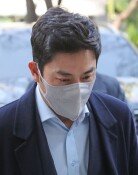Revised Constitution should restrict president’s ‘imperialistic powers’
Revised Constitution should restrict president’s ‘imperialistic powers’
Posted March. 12, 2018 07:31,
Updated March. 12, 2018 07:31
Korea’s special public advisory committee on the Constitution under the Presidential Commission on Policy Planning will confirm its proposed revision bill on Monday and report it to President Moon Jae-in, who is expected to move it to the National Assembly for a vote until March 20. The proposed draft includes several key issues including people’s basic rights and decentralization of power, but the country’s governing structure is the biggest issue over which the ruling and opposition parties are locking horns with each other. Chung Hae-gu, head of the special public advisory committee, said in a recent interview with The Dong-A Ilbo that the committee was “primarily considering a four-year, two-term presidential system.”
A gap between the parties’ stance on how to revise the Constitution regarding the power structure was more than noticeable at a forum about the constitutional amendment held by the Korea Press Foundation last Wednesday with National Assembly Speaker Chung Sye-kyun in attendance. The ruling Democratic Party has repeated its demand for two four-year presidential terms while the main opposition Liberty Korea Party has continued to insist upon a presidential system with more separation of powers.
Serious confrontation and suspicion of parties about the governing structure are in part inevitable as the country had earlier experienced a ruling bloc attempting to prolong its rule by revising a power structure. For example, Yun Jae-ok, senior deputy floor leader of the Liberty Korea Party, has condemned that the ruling Democratic Party “intended to extend its control” with a four-year, two-term presidential system. Meanwhile, the Democratic Party has also expressed doubt that the Liberty Korea Party’s real intention behind the proposal of a system with separated powers is “to take control of the National Assembly.”
With great affection for a direct presidential election system, the ruling party has continuously demanded that a presidential system should remain in place. One lawmaker of the Democratic Party, who is a member of the special parliamentary committee on constitutional revision and political reform, stressed, “From the ruling party’s viewpoint, it is difficult to make a concession on the holding of a national referendum concurrently with local elections scheduled for June, and a presidential system.” However, the Liberty Korea Party insists that the “imperialistic power” of the president cannot be restricted unless powers are practically shared. “A four-year, two-term presidential system is no different from the creation of a pair of “One Rings,” said Liberty Korea Party’s floor leader Kim Seong-tae, calling for a power-shared presidential system in which the president deals with foreign affairs while the prime minister handles domestic matters. “The National Assembly should be able to appoint the prime minister so that presidential powers can be checked,” Kim Jin-tae, lawmaker of the Liberty Korea Party, also said during a plenary meeting last Tuesday.
Similar to the Liberty Korea Party, the Bareun Future Party demands that the prime minister’s right of control over the parliament be stated in the Constitution and the prime minister be either appointed by the National Assembly or get approval from more than three-fifths of the vote. The Party for Democracy and Peace suggests that based on a four-year, two-term presidential system, the consent of the National Assembly should be required for the dismissal of the prime minister. Out of all opposition parties, the proposal of the Party of Democracy Peace is most similar to that of the ruling party.
Sang-Un Kim sukim@donga.com · Jeong-Soo Hong hong@donga.com







